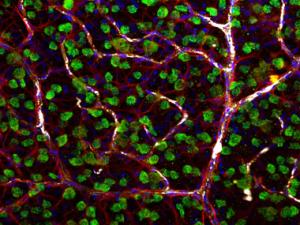

Research Expertise and Interest
inflammatory diseases, innate immune responses, lipid mediators, lipidomics, leukocytes, inflammatory resolution, eicosanoids, omega-3 PUFA, Dry Eye, lipxoygenase, cycloooxygenase, resolution pharmacology, neuroprotection, adaptive immunity, glaucoma
Research Description
Research efforts in the Gronert laboratory are part of a new paradigm that has established lipid networks as critical regulators for the successful execution of healthy immune responses and for maintaining tissue homeostasis. Our research team has focused on elucidating the role of these endogenous protective networks in ocular immune and reparative responses and neuroprotection. The role of these clinically important lipid mediators and their receptors is rapidly evolving but many questions about their regulation and molecular mechanisms of action remain to be answered. We have established sex-specific and dietary regulation of these tissue resident lipid mediator programs. Research in our laboratory employs innovative approaches and state-of-the art technology to discover and define the regulation of protective lipid mediator networks at the gene, enzyme, receptor and cell level. A long-standing expertise of our research group is LC/MS/MS-based lipidomics and lipid mediator bioinformatics. Our long-term goals are aimed at defining the regulation of protective lipid mediator programs in health and understand how they are dysregulated in diseases in order to develop innovative approaches for their therapeutic amplification.
Current Primary Areas of Research
Homeostatic Role and Therapeutic Potential of the Neuroprotective Retinal Lipoxin Circuit. The lipoxin circuit is an important paracrine signaling mechanism to maintain neuronal homeostasis and protect the retina, specifically ganglion cells, against neurodegeneration. We are investigating this astrocyte-neuroprotective network to define its dynamic regulation and mechanisms of action with neuronal cells and explore the efficacy of amplifying the lipoxin circuit as a therapeutic approach for glaucoma.
Lipid Mediators Programs as Regulators of Innate and Adaptive Immune Responses. Resident lipid mediator programs in the ocular surface, lymph nodes and retina control both the initiation and amplitude of acute inflammation and the functional response of lymphocytes for initiating adaptive immunity. We are investigating 1) the sex-specific regulation of lipid mediator programs as a potential cause for the high prevalence of autoimmune diseases in women, 2) role of immune-regulatory PMN phenotypes as a primary source of protective lipid mediators and regulators of lymphocyte function, 3) essential role of w-3 PUFA in maintaining and amplifying intrinsic protective lipid mediator programs and 4) the function and dysregulation of lipid mediator networks during “Inflammaging”.
